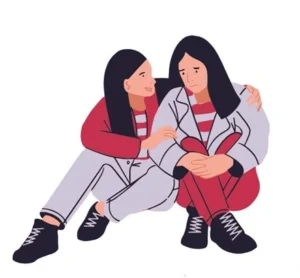
 Not all support is the same. To a certain point, caring for someone is as much helping someone as taking care of someone is. This can feel interchangeable, but themotivations behind your care reveal the truth. Helping is healthy support. It’s a favour you do for someone that doesn’t wildly inconvenience you. That’s anything from helping your friend carry groceries into their car, or letting your mom borrow that super cute purse she loves. Caring is one step deeper. It’s supporting someone emotionally. Being a shoulder to cry on, giving advice, or helping them through a tough situation.
Not all support is the same. To a certain point, caring for someone is as much helping someone as taking care of someone is. This can feel interchangeable, but themotivations behind your care reveal the truth. Helping is healthy support. It’s a favour you do for someone that doesn’t wildly inconvenience you. That’s anything from helping your friend carry groceries into their car, or letting your mom borrow that super cute purse she loves. Caring is one step deeper. It’s supporting someone emotionally. Being a shoulder to cry on, giving advice, or helping them through a tough situation.
When helping and caring go to the extreme, we find ourselves caretaking. While this may sound positive, it’s actually really unhealthy. The caretaking mentality makes sure you’re taking responsibility for other people’s choices, problems, and emotions. This often looks like rescuing, over functioning in relationships, and putting others needs before your own. This high value of outsiders over your own needs and feelings, can leave you feeling depleted and burnt out.

Caring and helping are important to fostering good healthy relationships. Caretaking however, feeds into a cycle of codependency. Leaving both people stuck repeating unhealthy patterns.
Caretaking often finds itself rooted in guilt, fear, or need for control. This is less about offering genuine support and more about managing those around you. Over time this creates a vast imbalance. One person (the caretaker) will find themselves taking responsibility for another’s entire situation. Their feelings and problems, all at the cost of their own. Caretakers will focus on another’s problems and end up neglecting their own.
This dynamic is the pillar of the codependent cycle. The caretaker feels needed and important, but leaves nothing for themselves. The other person never learns to stand on their own, and will find themselves always relying on others to solve their problems.
True caring is rooted in respect, boundaries, and trust in one another. They are paramount to breaking the codependent cycle. Belief that everyone can handle their own lives leaves everyone with enough time and energy to address their own issues. In this case all parties remain involved in their own processes, and no one loses themselves.
If any of these behaviours sound like you, you may be a caretaker. Constantly fixing, rescuing, or over functioning may not be from the love you’re thinking it’s rooted in. This may be an unconscious codependent pattern that we can break together.
The real question is: How can we STOP caretaking?
Breaking automatic cycles can be daunting but it starts with simple awareness. The key to becoming independent is to notice when you’re partaking in caretaking behaviours.
Try shifting your behaviours slowly and take notice of when you may be over functioning.
Before stepping in to help, ask yourself- “is this mine to do”?
Trust the people around you have the capability to figure their own problems out.
If it’s something you’re not comfortable doing, kindly set a boundary. Remember- saying no doesn’t mean you don’t care, it means you care enough to believe in their strength.
Refocus on yourself. Ask yourself why you feel the need to constantly help others. It may be because there’s something you’ve been avoiding yourself. Take some time to determine it, and try working on it for yourself. Your needs matter just as much as everyone else’s!
The goal with breaking a codependent cycle isn’t to stop caring for others. It’s to stop losing yourself in the process. Keep in mind true support is not carrying their load for them, it’s cheering them on while they do it for themselves.
If you found this blog interesting, stay tuned for the first book in our new “Book of the Month” series. It will be revealed on the first of September on Instagram and Facebook.
If you’d like to learn more about your own journey, gain personalized insights, and more, book a session with one of our specialists today!
Call us at 514 777-4530 now to book an appointment with the specialist who is right for you.
Or Visit our website at: https://www.helpforanxietydepression.com/ to learn more about our therapists and book online.
For more like this and daily updates follow us on Facebook (The Montreal Center for Anxiety and Depression) and Instagram (@mtlcenterforanxietydepresson)
